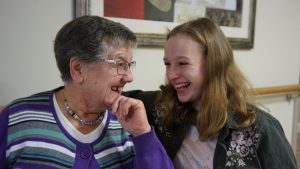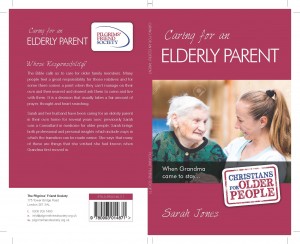Christmas is a great time for families getting together, and no-one is more delighted to have younger generations around than grandparents. But ageing is usually accompanied by physical changes and if you are having elderly relatives stay over this Christmas here are a few tips to make sure everyone has a happy, safe holiday.

More than presents, more than anything else, the greatest gift this Christmas is that of yourself –your attention, and your interest. It’s all about enjoying each other’s company. So try to persuade family members to come out of their parallel universes for a while and put their tablets and mobile phones aside for a while! On the other hand, if they hold photographs of birthdays and other family events, do show them.
If you haven’t seen an elderly relative for a while you can be taken aback by changes caused by frailty in ageing. If Grandma is slower to respond or answers questions wrongly don’t assume that she is developing dementia. It could be that she is temporarily disorientated by being out of her own home and routine, or it could be a poor circulatory system. Mild cognitive impairment (MCI) is often down to cardiovascular insufficiency. Also, check the obvious – does she use hearing aids? Don’t shout a question across the room but come close, preferably at eye level, and speak clearly at your normal speed. If you speak slowly, she may feel that you are cross with her. Also, be careful not to infantilise: being called ‘dear’ and talked down to was a major complaint from older ladies in a ‘You and Yours’ phone-in programme.
Suggest to everyone that when they talk to Grandma they make good eye contact, and expect conversations to take more time with her than they would with each other. This is especially important if there are other lively conversations taking place in the room.
Remove loose rugs that could be a trip hazard and provide a comfortable chair with a cushion or two for back support, and a footstool, if liked. Some older people like to have a light rug over their knees.
Sit Grandma where she has a good view of the room and if they’re used, check that spectacles and hearing aids are not forgotten. Remember that many older people like to sit and just observe quietly for a while. If there are younger children, let them sit with a colouring book or something to occupy themselves nearby. Older people and younger children get on fabulously well.
Make sure that she drinks enough fluids and has a steady side table to put cups of tea (and mince pies) on. Older people are not so good at balancing cups and plates.
A crowded room can become uncomfortably warm, and someone may open a window. But older people need to be warmer than most, so make sure she is not in a draught: think about covering her shoulders with a warm shawl or blanket.
Most older people don’t like loud, dissonant music. Perhaps play traditional music and carols until Grandma goes for an afternoon nap, then let the younger folk have their more boisterous music.
If a teenager has given up his bedroom, it may be an idea to check what’s up on the walls. Posters of Zombies or other lurid pictures don’t make for a good sleep for Grandparents. Perhaps cover them temporarily with a light wall hanging. Put a bedside lamp within easy reach, and leave a low light on upstairs at night for nocturnal visits to the bathroom. Again, remove any loose rugs.
And have a memorably happy Christmas time!
* * * * * * *

If you are looking after an elderly parent or relative, we have a helpful booklet, ‘Caring for an Elderly Parent’, written by Dr Sarah Jones. Sarah was a consultant in medicine for older people who left active practice to spend more time at home and care for her mother in law. You can obtain it easily through our website, www.pilgrimsfriend.org.uk














